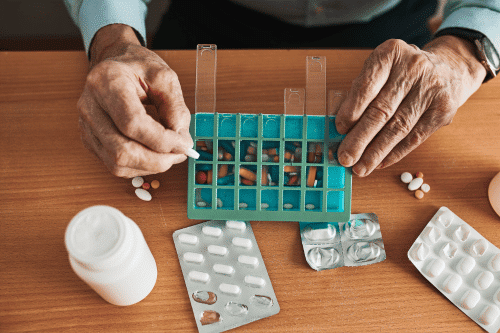I-2 Pill: Uses, Dosage, Side Effects, and Safety Considerations
The I 2 pill is a nonsteroidal anti-inflammatory drug (NSAID) that contains ibuprofen 200 mg. It is a widely used counter pain reliever for moderate pain, muscle aches, joint pain, and inflammatory conditions. This medication helps reduce body temperature, fever, and minor injuries while also providing relief from stomach pain, headaches, menstrual cramps, and back pain. However, it is important to follow the recommended dosage to avoid health risks, adverse effects, and long-term use complications.
Uses of the I-2 Pill
The I-2 orange pill, I-2 red pill, and I-2 oval pill are common forms of ibuprofen tablets used to relieve muscle pain, joint pain, and abdominal pain. This medication works by reducing the production of prostaglandins, which are chemicals in the body that cause pain, swelling, and fever. It is often prescribed for conditions such as chronic pain, inflammatory disorders, and minor injuries.
Individuals experiencing fever, cold symptoms, or muscle aches may also use nonprescription ibuprofen to manage their discomfort. Healthcare professionals often recommend ibuprofen treatment alongside physical therapy, heat therapy, or lifestyle modifications to achieve more effective treatment results.
Dosage Guidelines

Recommended Dosage for Adults
The effective dose for adults is 200 to 400 mg every four to six hours, depending on the severity of the types of pain being treated. The daily limit should not exceed 1,200 mg, as exceeding this amount can lead to kidney issues, gastrointestinal bleeding, and heart problems.
Dosage for Children
Children under 12 years old should use pediatric ibuprofen based on body weight. Adolescents over 12 may take 200 mg every four to six hours, but should not exceed 1,200 mg per day. A healthcare professional should always be consulted before giving ibuprofen gel or chewable tablets to children.
Adjustments for Specific Populations
Elderly individuals and those with kidney disease, kidney function issues, or a history of stomach problems should use lower doses under medical supervision. Patients with heart disease, coronary artery bypass graft history, or heart failure should consult their healthcare provider before using ibuprofen.
Identifying the I-2 Pill
The I-2 pill is round, orange or red, and approximately 10 mm in size. The drug imprint “I-2” is stamped on one side. Pill Identifier tools can help verify the correct medication. This medication is available in different forms, including generic forms, chewable tablets, and gel capsules.
Potential Side Effects
Common Side Effects
Ibuprofen can cause stomach upset, loss of appetite, and bowel movement changes. Some individuals may experience mild allergic reactions such as itchy skin, skin rash, or loosening of skin.
Serious Side Effects
More severe symptoms may include gastrointestinal bleeding, severe stomach pain, kidney failure, heart attack, and fluid retention. Those experiencing chest pain, shortness of breath, or unusual symptoms should seek emergency medical attention immediately.
Symptoms of an Allergic Reaction
Some individuals may develop difficulty breathing, irregular breathing, or a stiff neck after taking ibuprofen tablets. If any of these symptoms occur, seek emergency medical care right away.
Precautions and Warnings

Drug Interactions to Be Aware Of
Ibuprofen interacts with several common medications, including blood thinners, antiviral medications, and blood pressure medications. Combining ibuprofen with alcohol increases the risk of stomach problems and kidney damage. Individuals taking medication-assisted treatment for opioid addiction should also consult their healthcare provider before using ibuprofen.
Risks Associated with Misuse
The misuse of ibuprofen can lead to kidney issues, unwanted effects, and psychological dependence. Taking extra doses or exceeding the daily dose may result in ibuprofen overdose, which can cause irregular bleeding, Aseptic Necrosis, or heart issues.
Considerations for Those with Allergies
People with a history of allergies to NSAIDs should avoid taking ibuprofen. Some inactive ingredients, like microcrystalline cellulose and polyethylene glycol, may also trigger allergic reactions. Always check medication labels before use.
I-2 Pill Addiction and Misuse Risks
While ibuprofen is not an opioid, dependence on ibuprofen can occur with extended periods of use. Individuals who take higher doses than recommended, use it daily, or rely on it for every type of pain may be at risk for I-2 pill addiction.
Signs of Misuse
Misuse may include taking ibuprofen without a prescription, combining it with other pain relievers, or exceeding the recommended daily limit. Individuals struggling with medication misuse should seek help from health professionals and evidence-based treatment programs.
Support and Treatment Options
Treatment for I-2 pill addiction may involve behavioral therapy, family therapy, and medication-assisted treatment. Support groups and judgment-free healthcare professionals can also provide guidance for those looking to overcome their dependence on ibuprofen.
Alternatives to the I-2 Pill
For individuals looking for other pain relievers, acetaminophen (Tylenol) or naproxen (Aleve) may be suitable alternatives. Prescription alternatives include stronger anti-inflammatory drugs, muscle relaxants, and certain antiviral medications for specific conditions.
Proper Storage and Disposal Methods
Ibuprofen should be stored in a cool, dry place, away from direct sunlight. It should be kept out of reach of children to prevent accidental ingestion.
To dispose of unused medication, use a medicine take-back program or mix it with coffee grounds before discarding it in the trash. Avoid flushing medications down the toilet to prevent environmental contamination.
Resources for Further Information
For more information on ibuprofen and potential interactions, visit reputable sources such as Yale Medicine, the FDA (www.fda.gov), and the National Institutes of Health (www.nih.gov). Those in need of emergency medical care can contact Poison Control at 1-800-222-1222.
If you or someone you know is struggling with I-2 pill addiction, medication misuse, or opioid addiction, support is available through the Substance Abuse and Mental Health Services Administration (SAMHSA) hotline at 1-800-662-HELP.
Understanding the correct medication, safe daily dose, and potential side effects of the I-2 pill ensures effective treatment and responsible pain management. Always consult a health care provider before starting or changing any medication to minimize health conditions and health risks.
Frequently Asked Question's
The I-2 pill is an ibuprofen 200 mg tablet that belongs to the class of nonsteroidal anti-inflammatory drugs (NSAIDs). It is commonly used to relieve moderate pain, muscle pain, joint pain, and inflammation caused by conditions such as arthritis, menstrual cramps, headaches, back pain, and minor injuries. It also acts as a fever reducer and can help alleviate cold symptoms. However, individuals with a history of stomach problems, kidney disease, or heart disease should consult a healthcare provider before use.
Like all pain relievers, the I-2 pill can cause common side effects such as stomach pain, nausea, heartburn, dizziness, and loss of appetite. More serious adverse effects include gastrointestinal bleeding, severe stomach pain, kidney damage, and heart failure. Some individuals may experience itchy skin, skin rash, or shortness of breath, which could indicate an allergic reaction. If you develop chest pain, irregular breathing, or unusual symptoms, seek emergency medical attention immediately.
Ibuprofen interacts with several common medications, including blood thinners, blood pressure medications, and antiviral medications. Taking ibuprofen with these drugs may increase the risk of gastrointestinal disorders, kidney function problems, and heart issues. It is also important to avoid taking multiple NSAIDs or over-the-counter pain relievers together, as this can lead to an ibuprofen overdose. Always consult a health care professional before combining medications to prevent potential interactions.
To reduce the risk of stomach upset, ibuprofen should be taken with food, a glass of water, or a glass of milk. The effective dose for adults is 200 to 400 mg every four to six hours, with a daily limit of 1,200 mg unless directed by a healthcare professional. For children, dosage should be determined based on body weight and medical condition. Long-term use should be avoided unless under medical supervision, as extended periods of ibuprofen use can lead to kidney failure, fluid retention, and unwanted effects. If pain persists beyond a few days for pain relief, consult a health professional for alternative effective treatment options, including physical therapy or lifestyle modifications.












